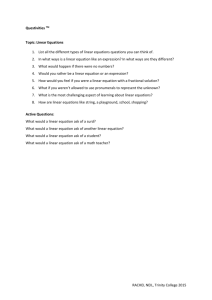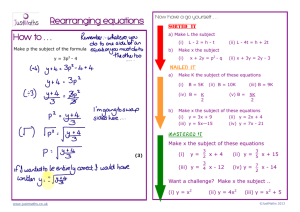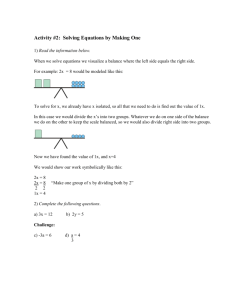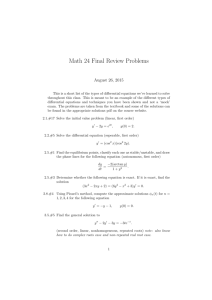MAT 244 Ordinary Differential Equations
advertisement
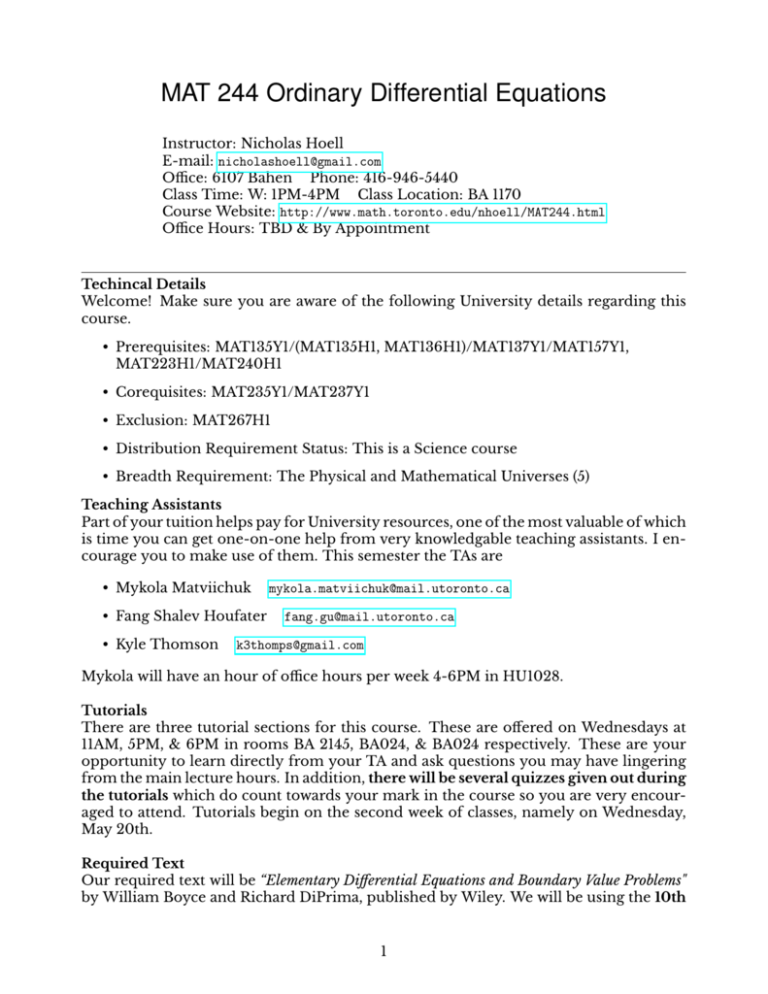
MAT 244 Ordinary Differential Equations Instructor: Nicholas Hoell E-mail: nicholashoell@gmail.com Office: 6107 Bahen Phone: 416-946-5440 Class Time: W: 1PM-4PM Class Location: BA 1170 Course Website: http://www.math.toronto.edu/nhoell/MAT244.html Office Hours: TBD & By Appointment Techincal Details Welcome! Make sure you are aware of the following University details regarding this course. • Prerequisites: MAT135Y1/(MAT135H1, MAT136H1)/MAT137Y1/MAT157Y1, MAT223H1/MAT240H1 • Corequisites: MAT235Y1/MAT237Y1 • Exclusion: MAT267H1 • Distribution Requirement Status: This is a Science course • Breadth Requirement: The Physical and Mathematical Universes (5) Teaching Assistants Part of your tuition helps pay for University resources, one of the most valuable of which is time you can get one-on-one help from very knowledgable teaching assistants. I encourage you to make use of them. This semester the TAs are • Mykola Matviichuk • Fang Shalev Houfater • Kyle Thomson mykola.matviichuk@mail.utoronto.ca fang.gu@mail.utoronto.ca k3thomps@gmail.com Mykola will have an hour of office hours per week 4-6PM in HU1028. Tutorials There are three tutorial sections for this course. These are offered on Wednesdays at 11AM, 5PM, & 6PM in rooms BA 2145, BA024, & BA024 respectively. These are your opportunity to learn directly from your TA and ask questions you may have lingering from the main lecture hours. In addition, there will be several quizzes given out during the tutorials which do count towards your mark in the course so you are very encouraged to attend. Tutorials begin on the second week of classes, namely on Wednesday, May 20th. Required Text Our required text will be “Elementary Differential Equations and Boundary Value Problems" by William Boyce and Richard DiPrima, published by Wiley. We will be using the 10th 1 edition. Other editions are fine but problem set question numbers will only correspond to the 10th edition. The substantive material hasn’t changed across editions but there are variations, particularly with regard to problem numbers so be aware of this if you decide to use an older edition. Online Textbook Instead of obtaining the physical textbook, you can opt to obtain the online textbook, which is cheaper than the (new) textbook. You can print and read it using a tablet app: Wiley e-Textbook It is also available through CourseSmart: CourseSmart e-Textbook In my experience, textbooks on introductory differential equations vary. You may find the online texts listed below may be more enjoyable that the required text. Explore! Alternative (More Advanced) Texts More mathematically inclined students may enjoy "Ordinary Differential Equations" by V.I. Arnold, published by MIT press. This is an excellent (and affordable), far more advanced, book on material appearing throughout this course. Those wishing to learn more of the theoretical underpinnings and extensions of topics in this course cannot go wrong with this book. In the same vein as the book by Arnold is ”Differential Equations, Dynamical Systems, and Linear Algebra" by Hirsch and Smale by Academic Press. Again, this is a more advanced treatment but is also considered a classic. Online Resources/Texts I also recommend the free text by Gabriel Nagy available at http://math.msu.edu/~gnagy/teaching/ode.pdf Grading Grades will be based according to some quizzes throughout the term, one midterm exam and a final exam. Your final grade in the course will be determined by the following • Quizzes 20%; the lowest score will be dropped • Midterm 35% • Final Exam 45% Optional problem sets will cover concepts discussed in the lectures as well as some material presented in the text. Problem sets will be offered a few times during the semester, but not for credit, and we will also have occasional quizzes during the term. Working through the recommended problems is essential to success in this course. Note on Exams No electronic devices/aids will be allowed during the exams. It is the students’ responsibility to ensure that the allotted exam time is available. 2 Questions & Concerns It is University policy that instructors need only reply to emails sent from University email accounts. Acceptable emails are of the form student@utoronto.ca, topstudent@math.toronto.edu, etc. I will not ever reply to a non-University email address (those from addresses like, say, studentwhoseemaildidntgetreturned@hotmail.com or studentwhodidntreadthesyllabus@gmail.com). As for email etiquette, sending technical mathematics questions is fine if they are very short but I really encourage you to save longer questions for the beginning Q&A part of the following lecture, or ask during office hours, since this will offer the greatest benefit to the largest number of students. Blackboard I tend to not use Blackboard except for sending out email to the class or when entering marks on tests and quizzes. For any important course information you should look to the course web site, part of my Toronto site, listed at the front of this syllabus. Academic Integrity (Important) Cheating (including plagiarism) is very serious and, consequently, will be taken very seriously. Cheating can result in failure or worse. Don’t do it! I caution you I am extremely diligent in pushing for the maximum possible penalties for those found cheating. Collaboration on the homework problem sets is fine, in fact I encourage it since discussing problems with your peers helps bolster your problem solving abilities, but the write-up should be done on your own, by your own hand. Any collusion during quiz or test situations will be thoroughly punished. Attendance I will not be taking attendance, however there are quizzes given during the semester. Also, the best & easiest way to stay on top of the material is by attending lectures and asking questions, so I encourage good attendance & participation. Late Assignment Policy No late assignments will be accepted without prior confirmation. Prerequisites Regardless of any formal requisites students need to be comfortable with standard calculus concepts like • The difference between an antiderivative and a definite integral • The fundamental theorem of Calculus, in its many guises • Partial derivatives • Various notations for partial derivatives • Matrix arithmetic and determinants, eigenvalues, eigenvectors, diagonalization, etc. This is a crucial part of the course that many students have trouble remembering how to do. Save yourself the headache and brush off your book on linear algebra now! Goals & Course Description Congratulations for having read this far! This summer, we will cover a variety of topics 3 within ordinary differential equations and explore some of the recurring themes in the subject. Differential equations is a subject best learned through case studies and we will, by examining several well-known equations from physics, encounter general methodology for analyzing qualitative and quantitative behaviour of their solutions. Part of the course involves learning a “bag of tricks" which can be useful for attacking differential equations based on their “type". Other parts of the course are about understanding qualitative features of solutions, regardless of whether one can quantitatively/explicitly solve the equation in question. The Menu I will keep us, roughly, to the following schedule (dates refer to week containing the Monday falling on the given MM/DD): • 5/11- Taxonomy of ODE & initial conditions. Direction Fields. Some solutions. Introduction to linear equations. • 5/18- First oder linear equations equations. Integrating factors. Separable equations. • 5/25- Autonomous equations. Population equations. Some basic modelling. • 6/1- Second order equations. Homogeneous equations with constant coefficients. The Wronskian. • 6/8- The Characteristic equations. • 6/15- Undetermined coefficients and parameter variation. • 6/22 - Exam Week. • 6/29- Equations of higher order. • 7/6 - Linear systems and Fundamental Matrices. • 7/13 - Phase portraits. Dealing with eigenvalues. • 7/20- Nonlinear theory and linearization. • 7/27 - Power series methods. • 8/3- Buffer & Review. In the above, Chapter numbers refer to the fifth edition of Haberman’s text and quite often we will cover only certain sections within a given chapter. 4



